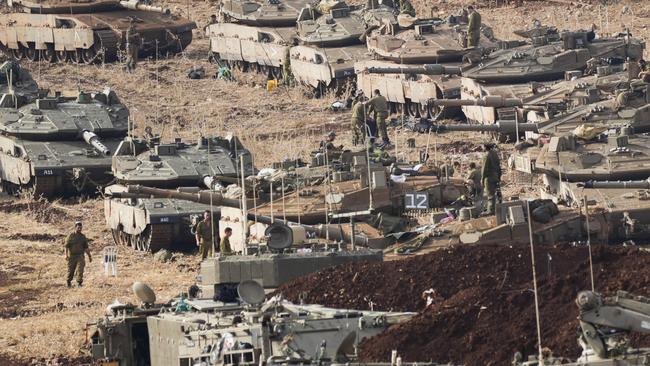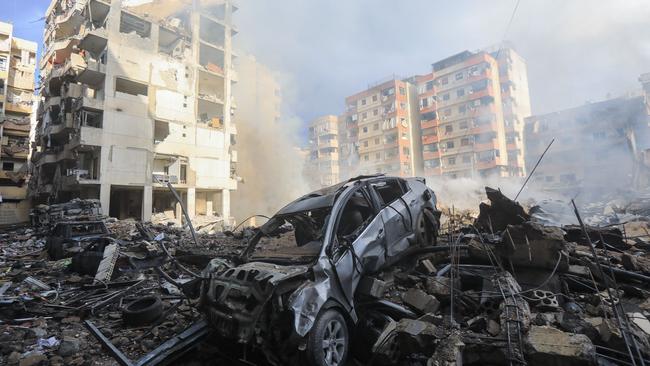
Yes, the US has just helped Israel to shoot down the latest Iranian missile barrage, but ever since the October 7 atrocity last year, while notionally recognising Israel’s right to self-defence, Washington has been urging Israel not to exercise it. At every stage the Biden administration has been calling for de-escalation, and more recently for a ceasefire, even though any ceasefire would mean that Hamas and Hezbollah didn’t just survive but would emerge as moral victors, at least to the Islamist world, bloodied but unbowed in their self-styled “heroic fight against Zionist genocide and Western imperialism”. Likewise, while the Biden administration denounces Russian aggression, the weaponry begrudgingly supplied by the Americans has always come with such strings attached that it merely slows down defeat rather than enables the Ukrainians to take the fight to the enemy.
Despite being told by Washington not to escalate, the Israelis have all but conquered Gaza, killed most of the Hezbollah leadership, incapacitated many of its key operatives and – thus far – scared the Iranians out of any serious retaliation. Told by Washington not to use any donated weaponry beyond its own borders, Ukraine still has managed a successful mini counter-invasion but can’t hit back hard enough to stop the relentless Russian advance.
Both Volodymyr Zelensky and Benjamin Netanyahu are utterly determined to save their countries but, in Zelensky’s case, courage and willpower on their own are not enough if the Americans fear Russian retaliation more than Ukraine’s defeat. The unfolding of these conflicts shows that, to Biden’s America, what matters at least as much helping its allies is not “provoking” its enemies, in this case a nuclear-armed Russia and an Iran that’s on the threshold of attaining nuclear weapons.
Once, an alliance with the US meant a country could not be attacked with impunity. Now, it’s more likely to mean an American ally will have its self-defence interfered with – seriously, in Israel’s case, with occasional delays in munitions supply; or cripplingly in Ukraine’s case, with the heroic Ukrainians forced to endure ceaseless attacks on civilian infrastructure that they can’t respond to in kind.
A US that’s increasingly isolationist on one side of politics and distracted by climate and identity concerns on the other simply can’t be counted on to help its friends to win. It may still be the indispensable nation, but it’s no longer a reliable one, especially if asked to escalate the defence of freedom into a fight that may not end well for America.
Obscured by the Albanese government’s constant moral posturing and essential pacifism, there’s a key lesson here for Australia.
Australia’s strategic situation is not quite that of Israel or Ukraine but it’s quite possible that a predatory power could covet what we have, should the world order ever decisively shift.

If confronted by an existential threat, whose position would we rather be in: that of Israel, the warrior state utterly resolved that “never again” will Jewish people be faced with a Holocaust and ready politely to ignore Washington when its survival is at stake; or that of Ukraine, which for years relied on the 1994 Budapest Memorandum on Security Assurances that has turned out to be hardly worth the paper it’s written on?
This is not an argument for abandoning our security partnership with the US, because even a militarily weaker and culturally enfeebled America remains the leader of the free world; or even, especially, a criticism of America’s demand for more self-help from its allies, as no self-respecting country should expect someone else to do more in its defence than it would itself. What should be imperative, though, for all US allies is a realisation of the extent to which they may have to fend for themselves.
Ever since the 1951 ANZUS Treaty, and especially since Britain’s substantial military withdrawal east of Suez in 1971, Australia’s security has depended on America’s recognition, as ANZUS stipulates, that “an armed attack on any of the parties would be dangerous to its own peace and safety” and that each party would then “act to meet the common danger” in accordance with its constitutional processes.
These days, on both sides of ANZUS, much less can be taken for granted. Under the Albanese government, the restraint the US is seeking to impose on its allies is matched by Australia’s neglect of its alliance responsibilities. Our refusal last December to send a frigate to protect freedom of navigation in the Red Sea was our first post-ANZUS failure to meet an American request for military help. And while talking up its commitment to AUKUS subs a decade hence, Labor is actually weakening our military capability and effort now – not ordering more aircraft, prematurely retiring frigates and failing to give surplus military equipment such as helicopters and tanks to Ukraine (instead selling them on a military eBay site) – perhaps so that it can cite inability rather than unwillingness should an American request come to help protect Taiwan.

America’s increasing detachment from other people’s fights, after seven decades of massive expenditure of blood and treasure to promote a peace that often has benefited others more, is understandable. What’s becoming unforgivable is others’ neglect of the military capability needed to deter the dictatorships united by a common hatred of the West.
Whether it’s militarist Russia, Islamist Iran or communist Beijing, there’s a common determination to replace the American-led liberal global order with a new system based on “might is right”.
This would be catastrophic for every free country, yet too many of them are still acting as if, when trouble hits, the US cavalry will come to their rescue.
The Albanese government is not even capable of telling police to break up pro-terrorist demonstrations, let alone taking real action to strengthen our armed forces now, or to boost the collective deterrence the West so badly needs. At 11 minutes to midnight, it feels like 1939 all over again, but this time the Allies are nowhere near as resolute or committed to their values.







Of the two countries currently fighting for their lives, Israel is winning and Ukraine is losing. Both countries are accepting American help, but only Ukraine really needs it – and needing American help for national survival is now the difference, in extremis, between staying free and slowly being crushed.